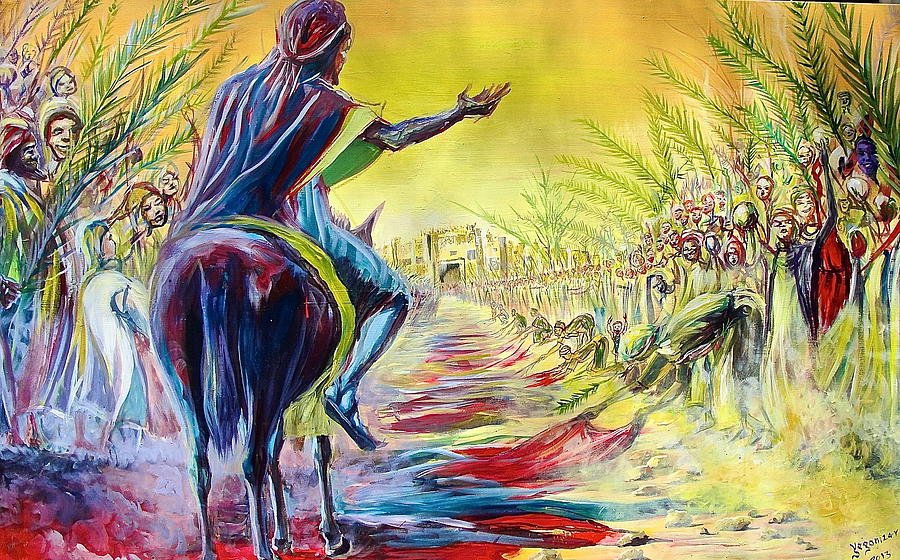A very different kind of kingdom

Based on Luke 19:28-40
Today is Palm Sunday, the day
when we remember Jesus’ triumphant entry into Jerusalem on a colt in the
days leading up to the Festival of the Passover. This is as a significant
event described in all four gospels. More often than not on Palm Sunday, we
hear about the symbolic significance of Jesus riding into the city on a
donkey, on a colt, the foal of a donkey, or both, depending on which gospel
we are hearing from that particular year. And we also often hear how just
five days later, instead of there being a crowd that was proclaiming him to
be the Messiah, there would be a crowd baying for his blood.
But this is probably not the only
public procession into Jerusalem today. The Roman Prefect of Judea Pontius
Pilate is also likely to be arriving. Pilate is not usually in Jerusalem. He
spends most of his time at his official residence in Caesarea Maritima, the
Roman civilian and military capital of Judea, which was on the Mediterranean
coast, just over 120 km from Jerusalem by today’s most direct road.
Jesus lives at a time when the
oppressive occupation of Judea is at about its strongest. And it is
customary for Roman Prefects of Judea to be in Jerusalem during major Jewish
festivals, and they do not get any bigger than the Passover. Pilate will be
well aware the Passover celebrates their liberation from an earlier empire,
Egypt, so this is a time when feelings could well run high about the current
occupation. He will be well prepared for possible trouble during Passover
week, especially with the massive influx of Jews into the city for the
occasion. Pilate’s entry into Jerusalem will be accompanied by a parade,
complete with horses and weapons, and he will be at the centre of it all,
riding not a donkey but a war horse, on the streets of Jerusalem, just prior
to the festival. This will intimidate people and put a stop to any thoughts
of insurrection.
It must be incredibly frustrating
for them. They will be oppressed and angry. And there is nothing they can do
but watch. But as we know. Jesus also comes to town. His entry into
Jerusalem is pivotal, provocative, and planned. Jesus knows the symbolic
significance of riding a colt, and so do those who are watching. They will
all be all familiar with the words of the Prophet Zechariah:
9 Rejoice
greatly, O daughter Zion!
Shout aloud, O daughter Jerusalem!
Lo,
your king comes to you;
triumphant and victorious is he,
humble and riding on a donkey,
on a colt, the foal of a donkey1
And when they see Jesus, they
call out:
‘Blessed is the king
who comes in the name of the Lord!
Peace in heaven,
and glory in the highest heaven!2
The significance of their
responses cannot be over-stated. Citizens of Rome make proclamations like
“Hail Caesar!” to Roman emperors, rulers who present themselves as sons of
God, if not gods themselves.
The people are putting themselves
at serious risk by praising someone else in the same manner.
But Jesus knows exactly what he
is doing. He knows that he is making an incredibly subversive statement
against the power of Rome. He is a colonised person directly challenging the
legitimacy of the coloniser. Rome might have wealth and military power, but
its carefully coordinated show of might does not silence everybody. And this
does not go unnoticed.
These two processions in
Jerusalem showcase two vastly different realms. Pilate represents the power,
glory, and material wealth of Rome. But Jesus represented
a very different kind of kingdom.
As
American theologian Adam Ericksen wrote, “When Jesus rode into Jerusalem on
Palm Sunday, he was revealing that the reign of God is in stark contrast to
the reign of Rome and every other political system that seeks triumphant
victory by influencing people through violence and coercion.”3
Later this week, Jesus will say
to Pilate, “‘My kingdom is not from this world,”4 but today he
rides into Jerusalem on a colt that has never been ridden, let alone seen
battle, a complete contrast to the Roman war horses.
This is an extremely subversive act. And
his radical
message
of love, forgiveness, justice, and peace is completely at odds with the
Roman way of doing things. No wonder he will be dead before the week is out.
The Roman Empire may have long ceased to exist, but
others have taken its place. And they continue to come and go, and the
material values they represent remain, for now anyway. But the radical
alternative offered by Jesus has never gone away. And the contrast between
values of those kingdoms and our ability to choose which one we follow has
not really changed.
Palm Sunday offers us an opportunity to stand with
him and show our solidarity with the hungry, the thirsty, the refugee, the
homeless, the sick, and the prisoner. To say no to the oppressive regimes of
our time. To challenge oppression, exploitation, and greed. And to protect
our planet, while we still can.
Palm Sunday is not a day to sit back and receive a palm cross to put somewhere to gather dust. Palm Sunday is a day to choose whether we follow Jesus and the risks that brings as he faces the final tumultuous week before he is killed. Or whether we follow the powers and principalities of the world he is standing against.
Darryl Ward
13 April 2025
1 Zechariach 9:9
2 Luke 19:38
3 http://www.patheos.com/blogs/teachingnonviolentatonement/2016/03/the-subversive-politics-of-palm-sunday/ (retrieved 12 April 2025)
4 John 18:36
All Bible references are from the New Revised Standard Version unless stated otherwise.